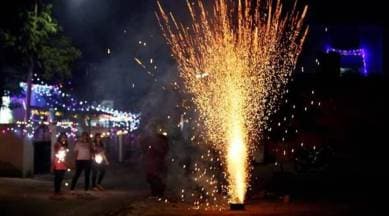📣 For more lifestyle news, click here to join our WhatsApp Channel and also follow us on Instagram
Delhi govt imposes ban on firecrackers; know how it can help
According to Dr Ravi Shekhar Jha, Director & HOD, Pulmonology, Fortis Escorts Hospital, Faridabad, firecrackers cause both air and noise pollution, which can have several harmful effects on public health and the environment, including respiratory problems, exacerbation of pre-existing health conditions, and damage to crops and buildings

The Delhi government announced a ban on the manufacturing, sale, storage, and use of firecrackers for the third consecutive year as part of an action plan to curb pollution in winter.
“We all know that the pollution level increases in Delhi during the winters. To tackle this, the Delhi government has started working on the winter action plan. Chief Minister Arvind Kejriwal has also decided to implement a complete ban on all kinds of crackers in the city,” Environment Minister Gopal Rai said.
While a ban on firecrackers is a welcome step, we reached out to experts to understand the health implications of crackers and how a complete ban can help curb pollution.
According to Dr Ravi Shekhar Jha, Director & HOD, Pulmonology, Fortis Escorts Hospital, Faridabad, firecrackers cause both air and noise pollution.
“This pollution can have several harmful effects on public health and the environment, including respiratory problems, exacerbation of pre-existing health conditions, and damage to crops and buildings,” he said.
Additionally, Dr Murarji Ghadge, consultant, ENT Surgeon and Sleep Disorder Specialist, Ruby Hall Clinic, said that firecrackers contain various chemicals, the residue of which can settle on the ground and water bodies, potentially harming the environment and aquatic life.
“After firecrackers are burst, their remnants become waste. Improper disposal of fireworks can contribute to environmental pollution,” he added.
Concurring, Raj Vardhan, OSD Chairman, NIIMS Hospital, Noida International University said, “The bright and colorful lights from fireworks can contribute to light pollution, disrupting the natural night environment and affect wildlife behaviour.”
Health implications of bursting firecrackers
The use of firecrackers can pose several health risks, especially during festive season and celebrations. Some of the health concerns associated with firecrackers, as per Dr Ghadge include:
*Respiratory issues: The smoke and emissions produced by fireworks contain harmful pollutants like sulfur dioxide, nitrogen oxides, and particulate matter. These pollutants can irritate the respiratory system and worsen pre-existing conditions such as asthma and bronchitis.
*Hearing damage: Firecrackers produce extremely loud sounds, which can lead to temporary or permanent hearing damage, especially if individuals are exposed to them at close range without hearing protection. Additionally, they can damage the eardrums leading to perforation, deafness, tinnitus, and giddiness.
*Stress and anxiety: The sudden and loud explosions caused by crackers can cause stress and anxiety, particularly in sensitive individuals, children, and pets. This can lead to increased heart rates, nervousness, and panic reactions.
*Injuries: Accidents related to the mishandling or malfunctioning of firecrackers can result in injuries, including burns, cuts, and eye injuries. In severe cases, these injuries can be life-threatening.
*Environmental allergies: The dust and particles released by fireworks can exacerbate allergies in some individuals, leading to symptoms like sneezing, runny nose, and itchy eyes.
*Mental health impact: The noise and air pollution caused by excessive fireworks can disrupt sleep patterns and lead to mental health issues such as insomnia, stress, and irritability.
*Environmental impact: While not a direct health concern for individuals, the environmental impact of crackers can affect public health indirectly. Pollution from fireworks can contribute to air and water pollution, which can have long-term consequences on ecosystems and, consequently, human health.
How can a ban on firecrackers help
A ban on crackers can help in numerous ways, addressing social, environmental and health concerns.
“When fireworks are restricted, we witness a significant reduction in air and noise pollution, leading to better air quality and improved public health. It’s crucial to understand that a ban alone isn’t enough — it must be enforced effectively,” Hrishit Panthry, Co-founder, Envirocare Foundation, a non-profit initiative to promote green living, said.
Further, it can help prevent injuries, reduce anxiety and stress in animals, protect ecosystems, conserve resources, enhance public safety, improve overall health outcomes for the population, and foster community well-being, Dr Ghadge noted.
Apart from this, a ban on firecrackers often encourages people to explore eco-friendly and sustainable ways to celebrate, the expert said, adding that LED lights, lanterns or diyas, help lower environmental and health impact.
However, Dr Swapnil Mehta, DM in pulmonary, critical care and sleep medicine, Dr LH Hiranandani Hospital, Powai, Mumbai noted that it is important to implement such bans with careful consideration of the cultural and economic aspects, which are deeply rooted in many societies.
“Public awareness campaigns and community engagement can play a crucial role in successfully transitioning away from the use of crackers during festivals, and moving towards cleaners and safer alternatives,” he concluded.
📣 For more lifestyle news, follow us on Instagram | Twitter | Facebook and don’t miss out on the latest updates!
📣 For more lifestyle news, click here to join our WhatsApp Channel and also follow us on Instagram